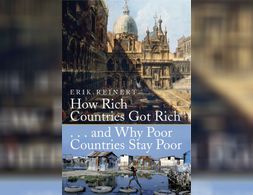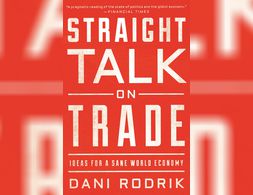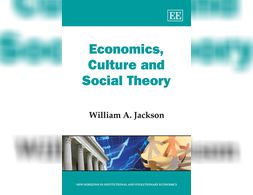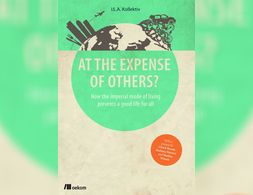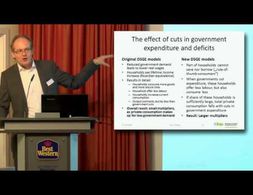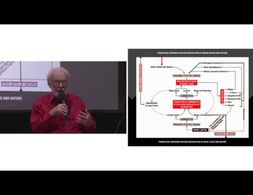✕
218 results
Following an unprecedented economic boom fed by foreign investment, the Russian Revolution triggered the worst sovereign default in history. Bankers and Bolsheviks tells the dramatic story of this boom and bust, chronicling the forgotten experiences of leading financiers of the age.
Economics has become a monolithic science, variously described as formalistic and autistic with neoclassical orthodoxy reigning supreme. So argue Dimitris Milonakis and Ben Fine in this new major work of critical recollection.
In this refreshingly revisionist history, Erik Reinert shows how rich countries developed through a combination of government intervention, protectionism, and strategic investment, rather than through free trade.
An honest discussion of free trade and how nations can sensibly chart a path forward in today’s global economy.
Immanuel Wallerstein provides a concise and accessible introduction to the comprehensive approach that he pioneered thirty years ago to understanding the history and development of the modern world.
Economics, Culture and Social Theory examines how culture has been neglected in economic theorising and considers how economics could benefit by incorporating ideas from social and cultural theory.
This book analyzes the transition of chocolate from an exotic curiosity to an Atlantic commodity. It shows how local, inter-regional, and Atlantic markets interacted with one another and with imperial political economies. It explains how these interactions, intertwined with the resilience of local artisanal production, promoted the partial democratization of chocolate consumption as well as economic growth.
In China's Gilded Age, Yuen Yuen Ang maintains that all corruption is harmful, but not all types of corruption hurt growth. Ang unbundles corruption into four varieties: petty theft, grand theft, speed money, and access money.
In this book, Carlota Perez develops her Neo-Schumpeterian concept of "techno-economic paradigms" which captures the patterns underlying the role of technological revolutions in economic development since the Industrial revolution.
When Santa Fe Institute Scientists first started working on economics more than thirty years ago, many of their insights, approaches, and tools were considered beyond heterodox. These once-disparaged approaches included network economics, agents of limited rationality, and institutional evolution—all topics that are now increasingly considered mainstream.
Written by the Nobel Prize winners in Economics Robert Shiller and George Akerlof, this book shows how deception and manipulation play a big role in the economic behavior of individuals, as well as showing how the assumption of "perfect information" is far away from the truth. Through both quantitative data and stories of how to reduce this noxious phenomenon, the authors paint a pretty different picture of how markets really works in a hyper-communicative scenario like nowadays.
Those who control the world’s commanding economic heights, buttressed by the theories of mainstream economists, presume that capitalism is a self-contained and self-generating system.
Mr Minsky long argued markets were crisis prone His moment has arrived The Wall Street Journal In his seminal work Minsky presents his groundbreaking financial theory of investment one that is startlingly relevant today He explains why the American economy has experienced periods of debilitating inflation rising unemployment and marked …
In this new book Smith returns to Solow s classic productivity paradox which essentially states that we can see automation everywhere like the spheres of leisure sociality and politics but not in the productivity statistics He examines why labor saving automation in the service age in the Global North has …
David Graeber introduces different concepts such as money and debt. He takes a historical and anthropological way of explaining the origin. This breaks with the mainstream explanation, which is used in many Economics textbooks, saying that a barter economy was before money arose.
In this lecture, Sanjay Reddy reviews the work of János Kornai, especially his critique of the socialist system, which is rooted in his understanding of the eminently political character of socialism.
The dominant view of inflation holds that it is macroeconomic in origin and must always be tackled with macroeconomic tightening. In contrast, we argue that the US COVID-19 inflation is predominantly a sellers’ inflation that derives from microeconomic origins, namely the ability of firms with market power to hike prices.
In the course Sociology and Socialism, students engage with classical theories of socialism as well as their applications in a variety of historical and international contexts. Staunchly interdisciplinary, the course utilizes expertise in philosophy, history, economics, sociology, anthropology and political theory.
Today it feels like everybody is talking about the problems and crises of our times: the climate and resource crisis, Greece's permanent socio-political crisis or the degrading exploitative practices of the textile industry.
Big challenges lie ahead for our society: increased automation of work, and the threat of catastrophic climate change. But so, too, are the huge possibilities presented by new technology and better ways of organising our economy in the wake of neoliberalism's failure.
In Colonial Debts Rocío Zambrana develops the concept of neoliberal coloniality in light of Puerto Rico's debt crisis. Drawing on decolonial thought and praxis, Zambrana shows how debt functions as an apparatus of predation that transforms how neoliberalism operates.
The first keynote speech was given by Sebastian Dullien, current spokesperson of FMM and who is one of the most well-known German economists in applied European economics and a very active contributor to the pluralist debate. Sebastian discusses the strategy of “running with the pack” by using orthodox methods to disseminate pluralist economics and politics. Referring to diverse examples Sebastian addresses the pros and cons of “running with the pack” and proposes alternative approaches to achieve more pluralism in economics.
Due to the economic crisis of 2008/2009, households faced drastic decreases in their incomes, the availability of jobs. Additionally, the structure of the labour market changed, while austerity measures and public spending cuts left households with less support and safeguards provided by the state. How have these developments affected the burden of unpaid labour and what influence did this have on gender relations?
Exploring Economics, an open-access e-learning platform, giving you the opportunity to discover & study a variety of economic theories, topics, and methods.
Paul Mason presents the main arguments of his book PostCapitalism. First, he argues that capitalism runs out of its capability to adapt to crises and second states that information technology challenges the capitalist system. In a nutshell, he argues that a society which fully exploits information technologies can't include concepts such as intellectual property, free market or private ownership. This has far-reaching consequences for the organisation of wages and work. The talk stops at minute 37.30.
This course describes Bayesian statistics in which one s inferences about parameters or hypotheses are updated as evidence accumulates You will learn to use Bayes rule to transform prior probabilities into posterior probabilities and be introduced to the underlying theory and perspective of the Bayesian paradigm The course will apply …
Capitalism is dissolving boundaries - not only in the sense of ever-expanding global trade flows, but also in the concrete everyday working lives of individuals. What implications does this have for our understanding of freedom, work and borders?
Marxist scholar David Harvey explains key concepts of capital from Marx. Applying Marx's analysis of capital to today's world, showing both the longevity and relevance of Marx's Capital, 150 years after its publication.
This course is an introduction to the economic theories of financial crises It focuses on amplification mechanisms that exacerbate crises such as leverage fire sales bank runs interconnections and complexity It also analyzes the different perspectives on the origins of crises such as mistaken beliefs and moral hazard and discusses …
Mainstream inflation theories in economics do little to explain the recent acceleration in price increases. The associated economic policy recommendations further increase the misery of low-income groups.
Trade disputes are usually understood as conflicts between countries with competing national interests, but as Matthew C. Klein and Michael Pettis show in this book, they are often the unexpected result of domestic political choices to serve the interests of the rich at the expense of workers and ordinary retirees.
'Impressive... provides a very good compendium of what are usually classified as "heterodox" development economics... an excellent volume.' Journal of International Development This important new collection tackles the failure of neoliberal reform to generate longterm growth and reduce poverty in many developing and transition economies.
We use cookies on our website. Click on Accept to help us to make Exploring Economics constantly better!



